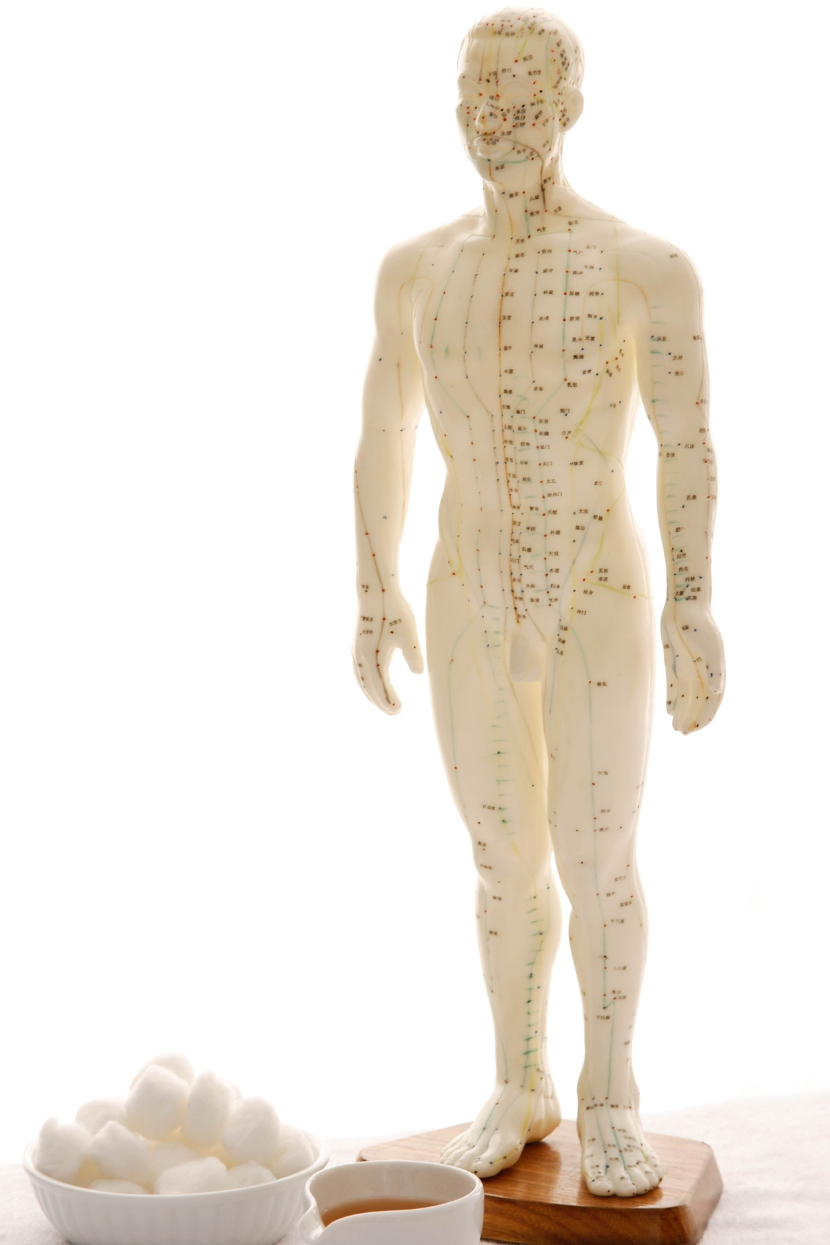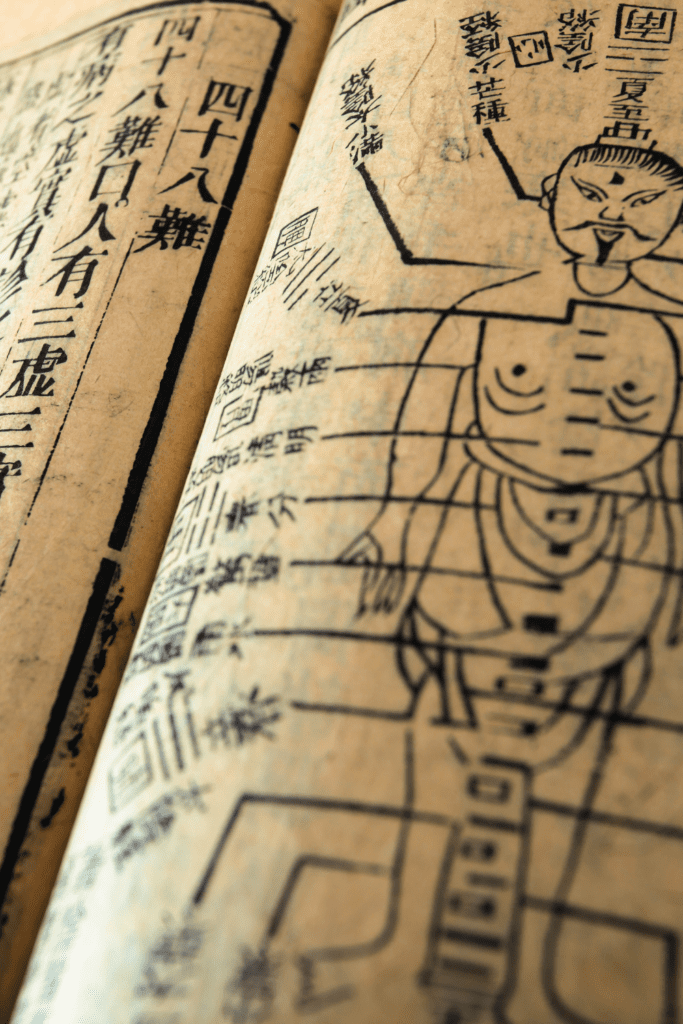Ahhhh, I love integrative medicine.
Don’t get me wrong—I love “conventional” medicine as well, but…
During my training to become a Registered Nurse, I learned about the drawbacks & limitations of western medicine: unwanted side effects, addressing symptoms rather than root causes, & doing costly & painful procedures that could have potentially been avoided.
Eastern medical traditions just seem to align more with my values & my belief that everyone is capable of improving their well-being!
In this blog post we’re going to dive into all things acupuncture: the science behind it, my experience with it, & whether it might be helpful on your holistic wellness journey.
What is Acupuncture?
Acupuncture is a technique used in Traditional Chinese Medicine (abbreviated TCM).
In TCM, it is believed that humans have an inner energy known as qi (”chi”) that is vital for health. When it’s out of balance, disease can occur.1
Qi runs through meridians & collaterals, which are energy pathways that connect each part of the body. Meridians go head to toe & left to right, & they basically run alongside our nerves & blood vessels!2
(Isn’t it cool when modern science aligns with ancient wisdom!?)
We have points on our skin where the qi from organs & meridians are brought to the body’s surface—these are called acupoints. 365 acupoints have been discovered so far.3

In acupuncture, a practitioner uses a thin needle (about the size of a strand of hair!) to slightly puncture the skin & stimulate acupoints.4
We’ll go into specifics in the next section, but this has several benefits…
- Connects the meridians, allowing qi to flow
- Rebalances yin & yang energy
- Stimulates the peripheral & central nervous systems5
The needles stay in for about 15-25 minutes6, & some studies have found the results remain for up to one year7 (but they didn’t say how many sessions it took to get to this effect).
You might also hear about electroacupuncture, which is where electricity is sent through the needles & different frequencies can yield different results8.
- It’s thought that this has become popular because it’s objective.9 You can standardize the amount of electricity you’re giving rather than just going off of what the patient thinks feels nice.
Now that we know what acupuncture is…what is an acupuncturist?
Though the name doesn’t allude to this, acupuncturists are trained in more than just acupuncture itself.
During their 3-4 year training they also specialize in herbs, cupping, moxibustion, body work, gua sha, & more!



If you’ve been looking for high quality gua shas or facial cups, I would highly recommend checking out the ones from Primally Pure. I’ve been using the facial cups a few times a week & they help reduce puff, release tension in my jaw, & they feel luxurious! Use my link to get $10 off your purchase of $50 or more!
Does Acupuncture Work? How??? 🤔
Acupuncture itself has been around for almost 3,000 years (people used to use sharpened stones & bones10—glad we’re not in that era anymore… 😅) & there have been over 20,000 studies done on it11.
While looking at some of the research, I was disappointed to see some conflicting data…
There were some studies that found that “sham” acupuncture (where random points are poked) had the same effects as actual puncture, making it seem as though the effects were all based on placebo12.
However, when something persists over millennia, normally it’s because it’s effective!

Here’s the physiology of acupuncture…
- Can stimulate the parasympathetic nervous system (rest & digest)13 & also GABA production, helping to reduce stress14
- Can increase blood flow to certain areas of the brain, helping with memory & neuroplasticity15
- In a mouse study, helped the body cope with cytokine storms & decrease overall inflammation through stimulating dopamine release16
- May release endorphins & opioids produced by the body that help reduce pain17
Overall, it is definitely found to help, but it might not be all related to the needles themselves…
Several articles I read point to the the fact that a patient’s belief in the treatment will play a role in their response to it18. Our minds are powerful!
(& on that note, if you haven’t read the book You Are the Placebo by Joe Dispenza, it’s a super fascinating read!!)
What Can Acupuncture Help With?
Tbh, what can’t it help with? 😅
It’s primary claim to fame came from helping to treat pain1920, but it can help with a lot more than that!
It can help with all types of acute & chronic pain:
- Neck or back pain
- Arthritis (specifically, osteoarthitis)
- Headaches, including migraines
- Sciatica
- Post-operative pain (check with your provider, especially if the surgery you had requires you to be on blood thinners!)
- Cancer
- Irritable Bowel Syndrome
- Fibromyalgia
Other than pain, it can also help with…
- Seasonal allergies
- Nausea & vomiting (including the side effects from chemotherapy)
- Asthma
- Infertility (the data is mixed, but there are acupuncturists who specialize in this specifically)
- Hot flashes associated with menopause, & other women’s hormone health at large21
It honestly seems to be a cure-all, & the best part is that it doesn’t really have any negative side effects.
Needles are regulated by the FDA & must be sterile & one-time use22, so no need to worry about infections from those.
Like we talked about, acupuncturists go through at least 3 years of training & have to get licensed to practice in most states23, so they’re highly skilled professionals.
There’s nothing to lose! ◡̈
My Personal Experience With Acupuncture
After being a nurse for almost five years, it finally happened…I threw out my back on the job 🥲
Even though I was being provided with provider & PT visits, my body felt like it needed even more TLC.
I had already been to a chiropractor for a previous injury & wanted to try something new.
I stumbled across acupuncture & I am soooo glad I took the plunge!
Surprisingly (& to my delight!), the needles are pretty painless. My acupuncturist has me exhale with every insertion & I can barely feel it. Once they’re in, I don’t notice them.

Unlike other therapies, you can use acupuncture with an acute injury. Because our qi runs along meridians, there’s no need to mess with the injured area itself!
During my first session, she put the needles in my lower legs & arms. I immediately felt my lower back release & I walked out of the session with zero pain!
I finished my third session yesterday & can honestly say I’m prettttty obsessed 🤎
It’s been almost a month since my initial injury & I am feeling way better. I had my first pain-free workday! I still avoid turning folks, wear a brace, etc etc, but I’m calling it a win!
Random Tidbit!
B & I just finished watching Legend of Korra (phenomenal, if you haven’t seen it!!) & there was a scene where a character receives acupuncture & has a lot of emotions & memories come up.
This happened to me during my first sesh & my acupuncturist told me it was very normal, & that the needles can bring up emotions that have been stuck in our bodies!
We looooove a good somatic modality 👏🏼
Things to Consider Before Receiving Acupuncture
While acupuncture has been super effective for me, it’s not a replacement for seeking treatment from your provider.
There are a lot of acupuncturists out there (there’s even one right across the street from where we live!), & I’m not entirely sure how I came across the one I work with now. It’s probably a blend of fate & good SEO on their end.
Make sure your practitioner is licensed & check to see if they have other offerings you’d be interested in.
For example, at the wellness clinic where I go, they also have facials—even acupuncture facials! I’d love to try this one day. Other clinics don’t offer this.

Not every acupuncturist has the same offerings, so check out what they have. Also, it’s important to find a practitioner you feel comfortable with.
Some insurances do pay for acupuncture, but my insurance kind of…uhh…isn’t the most robust, unfortunately 😅 I currently pay out of pocket.
If you want to use insurance, make sure to make sure to call the company to see who is in-network before you book anything!
All in all, acupuncture is a phenomenal healing modality to try, with lots of benefits & minimal risks!
If you do try it out, lmk what you thought.
If you have any questions, leave them below! ◡̈
- Zhu, J., Li, J., Yang, L., & Liu, S. (2021). Acupuncture, from the ancient to the current. Anatomical record (Hoboken, N.J. : 2007), 304(11), 2365–2371. https://doi.org/10.1002/ar.24625 ↩︎
- Brazier, Y. (n.d.). Acupuncture: How it works, uses, benefits, and risks. Medical News Today. https://www.medicalnewstoday.com/articles/156488#how-does-it-work
↩︎ - Ifrim Chen, F., Antochi, A. D., & Barbilian, A. G. (2019). Acupuncture and the retrospect of its modern research. Romanian journal of morphology and embryology = Revue roumaine de morphologie et embryologie, 60(2), 411–418. ↩︎
- Kelly, R. B., & Willis, J. (2019). Acupuncture for Pain. American family physician, 100(2), 89–96. ↩︎
- Zhu, J., Li, J., Yang, L., & Liu, S. (2021). Acupuncture, from the ancient to the current. Anatomical record (Hoboken, N.J. : 2007), 304(11), 2365–2371. https://doi.org/10.1002/ar.24625 ↩︎
- Kawakita, K., & Okada, K. (2014). Acupuncture therapy: mechanism of action, efficacy, and safety: a potential intervention for psychogenic disorders?. BioPsychoSocial medicine, 8(1), 4. https://doi.org/10.1186/1751-0759-8-4 ↩︎
- National Institute of Health. (n.d.). Acupuncture: What you need to know. National Center for Complementary and Integrative Health. https://www.nccih.nih.gov/health/acupuncture-what-you-need-to-know ↩︎
- Kawakita, K., & Okada, K. (2014). Acupuncture therapy: mechanism of action, efficacy, and safety: a potential intervention for psychogenic disorders?. BioPsychoSocial medicine, 8(1), 4. https://doi.org/10.1186/1751-0759-8-4 ↩︎
- Zhu, J., Li, J., Yang, L., & Liu, S. (2021). Acupuncture, from the ancient to the current. Anatomical record (Hoboken, N.J. : 2007), 304(11), 2365–2371. https://doi.org/10.1002/ar.24625 ↩︎
- Zhu, J., Li, J., Yang, L., & Liu, S. (2021). Acupuncture, from the ancient to the current. Anatomical record (Hoboken, N.J. : 2007), 304(11), 2365–2371. https://doi.org/10.1002/ar.24625 ↩︎
- https://cam-therapies.co.uk/acupuncture/how-does-acupuncture-work/ ↩︎
- Kawakita, K., & Okada, K. (2014). Acupuncture therapy: mechanism of action, efficacy, and safety: a potential intervention for psychogenic disorders?. BioPsychoSocial medicine, 8(1), 4. https://doi.org/10.1186/1751-0759-8-4 ↩︎
- Kelly, R. B., & Willis, J. (2019). Acupuncture for Pain. American family physician, 100(2), 89–96. ↩︎
- Brazier, Y. (n.d.). Acupuncture: How it works, uses, benefits, and risks. Medical News Today. https://www.medicalnewstoday.com/articles/156488#how-does-it-work
↩︎ - Brazier, Y. (n.d.). Acupuncture: How it works, uses, benefits, and risks. Medical News Today. https://www.medicalnewstoday.com/articles/156488#how-does-it-work
↩︎ - Pesheva, E. (2020, August 12). Quieting the storm. Harvard Medical School. https://hms.harvard.edu/news/quieting-storm
↩︎ - Yuan, Ql., Wang, P., Liu, L. et al. (2016). Acupuncture for musculoskeletal pain: A meta-analysis and meta-regression of sham-controlled randomized clinical trials. Sci Rep 6, 30675. https://doi.org/10.1038/srep30675 ↩︎
- National Institute of Health. (n.d.). Acupuncture: What you need to know. National Center for Complementary and Integrative Health. https://www.nccih.nih.gov/health/acupuncture-what-you-need-to-know
↩︎ - Lin, J. G., Kotha, P., & Chen, Y. H. (2022). Understandings of acupuncture application and mechanisms. American journal of translational research, 14(3), 1469–1481. ↩︎
- Vickers, A. J., Vertosick, E. A., Lewith, G., MacPherson, H., Foster, N. E., Sherman, K. J., Irnich, D., Witt, C. M., Linde, K., & Acupuncture Trialists’ Collaboration (2018). Acupuncture for Chronic Pain: Update of an Individual Patient Data Meta-Analysis. The journal of pain, 19(5), 455–474. https://doi.org/10.1016/j.jpain.2017.11.005 ↩︎
- National Institute of Health. (n.d.). Acupuncture: What you need to know. National Center for Complementary and Integrative Health. https://www.nccih.nih.gov/health/acupuncture-what-you-need-to-know
↩︎ - Brazier, Y. (n.d.). Acupuncture: How it works, uses, benefits, and risks. Medical News Today. https://www.medicalnewstoday.com/articles/156488#how-does-it-work
↩︎ - National Institute of Health. (n.d.). Acupuncture: What you need to know. National Center for Complementary and Integrative Health. https://www.nccih.nih.gov/health/acupuncture-what-you-need-to-know
↩︎
